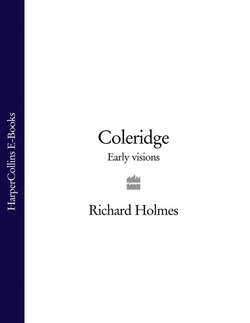Читать книгу Coleridge: Early Visions - Richard Holmes - Страница 21
5
ОглавлениеIn spring 1787 Luke qualified as a doctor, and returned to Devon to take up a practice at Thorverton, near Exeter, where he was soon to marry. Coleridge missed him greatly – “I have now no one, to whom I can open my heart in full confidence” – and asked him to keep up “an epistolary correspondence”. In May that year he sent Luke his first serious poems, six stanzas on “Easter Holidays”, and a Latin translation which was accepted by Bowyer for the Christ’s Hospital “Album”. This was a notable distinction at the age of fourteen and a half. The theme is loneliness and misfortune, rendered in the manner of Gray:
Then without child or tender wife,
To drive away each care, each sigh,
Lonely he treads the paths of life,
A stranger to Affection’s tye…22
Bowyer promised he would be a Deputy Grecian within a year, “if I take particular care of my exercises etc”. Coleridge added that the Bowdons were still very kind to him – “I dine there every Saturday” – and that George in Hackney was now his mainstay. “He is father, brother, and every thing to me.”23 Instead of plum cake, he now asked for a copy of Edward Young’s Night Thoughts, the famous volume of the “Graveyard School”, with its celebration of solitary musings on death and mutability. Adolescence had arrived.
Over the next two years poetry, classics and Platonic philosophy became his dominant interests, as befitted a Grecian. He also discovered his own protégé, a boy called Tom Evans, whose widowed mother lived in London with three teenage daughters, soon to be extravagantly courted by Coleridge and the dashing Bob Allen. It was a time of rapid intellectual development, with long enthusiastic talks in the cloisters, alternating with lonely hours spent up on the school leads – or flat roof. Coleridge found he could secretly climb out through a Ward window and sit gazing at the sunset and the stars, with the spires and domes of the city laid out beneath him.
The taste for roof-top contemplation was one that returned to him years later, at Greta Hall in Keswick. It was there in 1802 that he recalled the first stirrings of his poetic longing, the rich self-conscious sense of beauty and isolation in the world.
In my first Dawn of Youth that Fancy stole
With many secret Yearnings on my Soul.
At eve, sky-gazing in “ecstatic fit”
(Alas! for cloister’d in a city School
The Sky was all, I knew, of Beautiful)
At the barr’d window often did I sit,
And oft upon the leaded School-roof lay…24
Coleridge often later talked of these inspired times to his friends – he described them also in “Frost at Midnight” – and it is interesting how each subtly adapted them to conform to quite different aspects of his boyhood mythology. For Wordsworth, they became the “seedtime” of a visionary poet, the “liveried schoolboy, in the depths of the huge city, on the leaded roof”, who lay alone gazing upon “the clouds moving in heaven”, and who closed his eyes to see by the “internal light” of imagination
…trees, and meadows, and thy native Stream,
Far distant, thus beheld from year to year
Of thy long exile.25
By contrast, for Charles Lamb the genius of Coleridge was not solitary at all. He saw him already as a public figure, finding his natural audience in the gregarious cloisters of Christ’s Hospital – not exiled amidst the clouds but thoroughly at home amidst a circle of admiring boys, urbane, eloquent and sociable. Lamb wrote a celebrated encomium of this schoolboy hero, a radiant figure already bursting with confidence, though perhaps comically so:
Come back into memory, like as thy wert in the dayspring of thy fancies, with hope like a fiery column before thee – the dark pillar not yet turned – Samuel Taylor Coleridge – Logician, Metaphysician, Bard! – How I have seen the casual passer through the Cloisters stand still, entranced with admiration (while he weighed the disproportion between the speech and the garb of the young Mirandula), to hear thee unfold, in thy deep and sweet intonations, the mysteries of Jamblichus, or Plotinus (for even in those years thou waxedst not pale at such philosophic draughts), or reciting Homer in his Greek, or Pindar – while the walls of the old Grey Friars re-echoed to the accents of the inspired charity boy!26
This is a very different Coleridge from the Wordsworthian exile. Nor does Elia take him entirely seriously – the Neoplatonic mystics and gnostics have the air of being plucked out of a conjuror’s hat, and there is a certain undercurrent of affectionate mockery. In the frequent “wit-combats” with Val Le Grice in the cloisters, Lamb added shrewdly that Coleridge was like a magnificent Spanish galleon – “far higher in Learning”, but wordy and cumbersome – being harried by an English man-o’-war, quick and inventive.
